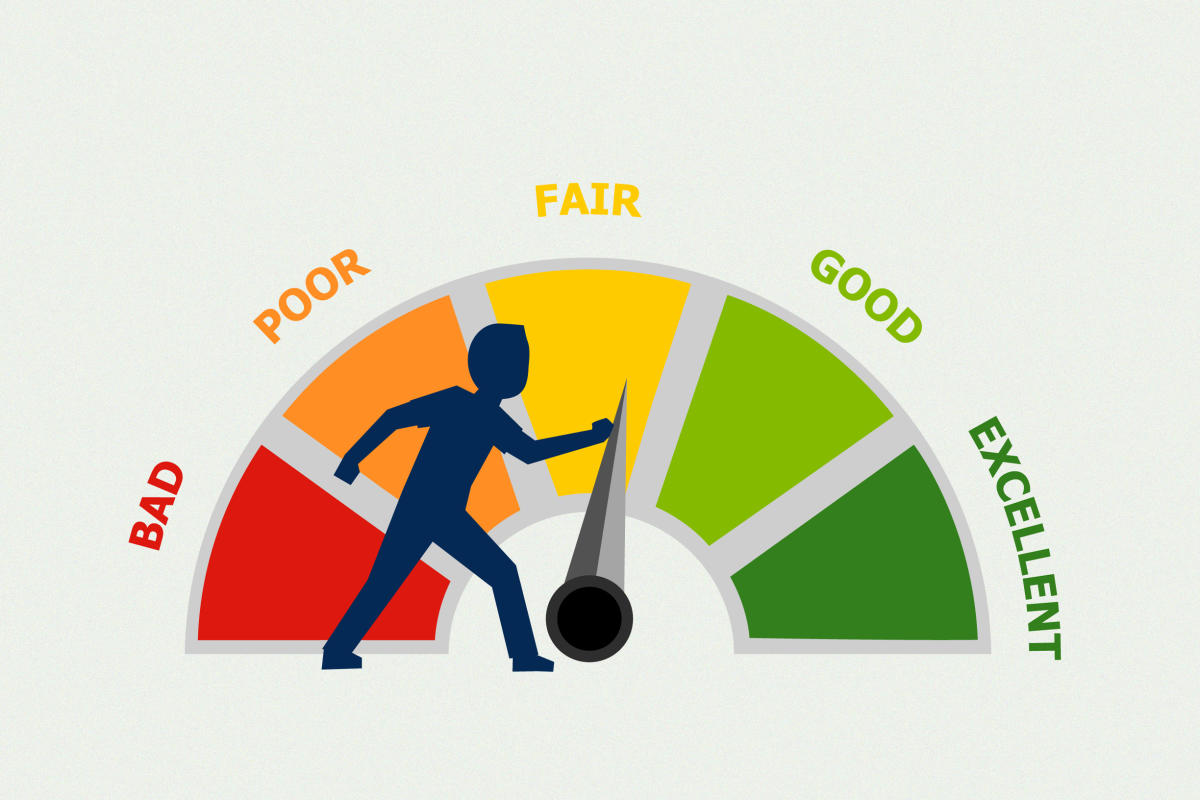Personal Finance
7 Ways to Improve Your Credit Score Right Now

Having a good credit score can make a world of difference for your finances.
Americans with strong credit scores get offered better rates when they need to borrow money, whether it’s taking out a loan for a car, house or some long-planned home repairs.
Interest rates on all kinds of credit products, including personal loans, student loans and mortgages, have soared as the Federal Reserve has raised interest rates to try to slow inflation down. That means your credit score matters a lot right now.
If you’re buying a house, a good credit score could save you several hundred dollars in your monthly payments. A borrower with a “fair” score of 620 would qualify for a mortgage rate of 8.26% for a 30-year fixed-rate conforming loan, on average. For a $350,000 loan, the monthly payment would come out to $2,631.
Compare that to a borrower with an “excellent” score of 740, who would qualify for an average rate of 7.03% and pay $295 less each month.
Even if you’re not making a big purchase, a good credit score offers benefits for just about everyone. Strong credit can help you find an apartment, procure insurance and qualify for the best credit cards, which offer rewards and come with low annual percentage rates, or APRs.
You always want to avoid carrying a balance on your credit card, but the reality is many people do. The average American borrower’s credit card balance rose by nearly $700 last year amid high inflation, meaning raising your credit score, and thereby finding a card with a lower APR, could save you money each month on your credit card bill.
If your credit score needs work, it’s a great time to consider strategies to get it up. Don’t expect your score to soar immediately — improving your credit takes time and patience — but the following steps can get you on track.
How to raise your credit score
Your credit score is meant to tell lenders whether you are a high or low-risk borrower. Both FICO and VantageScore (the score developed by the three major credit bureaus — Experian, TransUnion, and Equifax) will range from 300 to 850. A score of 700 is considered “good.” The better your credit score, the better interest rates and terms you’ll be offered by lenders.
1. Pay your bills on time
According to Experian, payment history is the most influential factor for both your FICO and VantageScore. From a lender’s perspective, an established history of timely payments is a good indicator you’ll handle future debts responsibly, too.
“You want to avoid things like late payments, defaults, repossessions, foreclosures, and third-party collections,” says John Ulzheimer, credit expert, formerly of FICO and Equifax. “And filing bankruptcy is a horrible idea. Anything that would indicate non-performance of a liability is going to harm your credit score.”
2. Keep your credit utilization rate low
Weigh your balances relative to your credit limit to ensure you’re not using too much available credit, a practice that can indicate risk.
Ulzheimer recommends trying to maintain a utilization rate of 10%. “The higher that ratio, the fewer points you’re going to earn in that category and your scores are absolutely going to suffer,” he says. “In fact, people who have the highest average FICO scores have a utilization of 7%.”
The date your credit card provider reports to the credit bureaus may also impact your utilization rate.
Ulzheimer points out that FICO’s scoring systems don’t differentiate between those who pay in full each month and those who carry a balance. Your utilization rate at the time your issuer reports is what’s used for your score. VantageScore, though, does consider whether you pay in full or carry your balance month to month.
If you struggle with high balances and mounting interest payments on your cards, consider consolidating with a 0% introductory rate balance transfer credit card, but make sure you know when the rate will increase and by how much.
3. Leave old accounts open
Once you finally get rid of student debt or pay off your auto loan, you may be impatient to get any trace of it wiped from your report.
But as long as your payments were timely and complete, those debt records may actually help your credit score. The same is true for your credit card accounts.
“An account that’s paid in full is a good thing; however, closing an account isn’t something that consumers should automatically do in the hopes that it will positively impact their credit score,” says Nancy Bistritz-Balkan, vice president of communications and consumer education at Equifax. “Having an account with a long history and solid track record of paying bills on time, every time, are the types of responsible habits lenders and creditors look for.”
Closing a credit card account can actually lower your credit score, as you will now have a lower maximum credit limit. If you’re still carrying balances on other cards or loans, your utilization ratio will go up. You’re better off keeping the card with a $0 balance.
Any bad debts that can impact your score negatively are automatically removed over time. According to Ulzheimer, bankruptcies can stay on your credit report for no longer than 10 years, while late payments and delinquencies such as collections, repossessions, foreclosures and settlements stay on your report for seven years.
4. Take advantage of score-boosting programs
The number of accounts and the average age of your accounts are both important factors in your credit score, which can leave those with limited credit history at a disadvantage.
Experian Boost and UltraFICO are programs that allow consumers to boost a thin credit profile with other financial information.
After opting into Experian Boost, you can connect your online banking data and allow the credit bureau to add telecommunications and utility payment histories to your report. UltraFICO allows you to give permission for your banking data, like checking and savings accounts, to be considered alongside your report when calculating your score.
5. Only apply for credit you need
Every time you apply for a new line of credit, a hard inquiry is pulled on your report. This type of inquiry lowers your score temporarily. Applying just to see if you get approved or because you received a pre-qualified offer of credit is not a good idea.
If it’s a single hard credit pull, the drop will be slight. However, a string of hard inquiries could signal to lenders that you are taking on too much debt. The effects of a hard credit pull on your score, according to a representative of TransUnion, can last up to 12 months.
If you do need to apply for new credit, research your likelihood of approval to ensure you’re a good candidate before applying. If possible, get a pre-approval or pre-qualification, as in many instances these result in a soft rather than hard credit pull. Soft pulls don’t affect your credit score. You don’t want to risk lowering your score for a denied application.
You should also refrain from applying for several credit cards within a short time frame, or before taking out a large loan like a mortgage.
When you shop for a mortgage, auto, or personal loan, you can keep hard inquiries to a minimum by making rate comparisons within a short time period. Applications for the same type of loan within a designated time frame will only appear as a single hard inquiry. According to FICO, this span can vary from 14 to 45 days.
6. Be patient
You won’t drastically improve your credit score overnight. The best way to achieve an excellent score is to develop good long-term credit habits.
According to Ulzheimer, two influential factors that go into your score are the average age of information and the oldest account on your report.
“You’re really going to need to have credit for a couple of decades before you max out those categories,” Ulzheimer says. “It takes a really, really long time to improve a bad score and it takes a really short amount of time to trash a good score.”
Establish good habits, like paying your balances on time, keeping a low utilization rate, and applying for credit only when you need it, and you should see those practices reflected in your score over time.
7. Monitor your credit
When you view your own credit, a soft inquiry is pulled, which doesn’t affect your credit the way hard inquiries do.
Monitoring your score’s fluctuations every few months can help you understand how well you’re managing your credit and whether you should make any changes. However, you shouldn’t base any financial decision you make solely on your credit score.
“I wouldn’t recommend hanging every decision on a credit score, but hanging every decision on what matters,” says Jeff Richardson, spokesperson for VantageScore. “Focusing on your financial health and your family’s health is priority number one.”
How to check your credit report
You can get a free copy of your report at annualcreditreport.com.
Under normal circumstances, you would be able to get one free report from each of the three major credit reporting bureaus (Experian, TransUnion, and Equifax) per year. However, in response to COVID-19 you can access a free weekly report from any of the bureaus through December 31, 2023.
Check your credit report for errors, which could be dragging your score down. If you find mistakes, you can get items removed from your credit report by disputing the information directly with the credit bureau. They are obligated to investigate any dispute and resolve it within a reasonable amount of time. Keep in mind, however, that only incorrect information can be removed from your report.
According to Richardson, each credit report will have the information you need to improve your score. “There are four or five bulleted statements about your credit profile that can help you make a road map of what to do if you’re really in a position where you need to improve your score,” he says.
You may also find a numerical or text code in your report, but no additional information as to what it represents. These are factor codes and represent items that may be dragging your score down. VantageScore has a free website, ReasonCode.org where you can enter the code from any credit report and get an explanation of what it stands for and advice on how to resolve the issue.
If you’re unsure if there are mistakes on your report or have trouble getting issues resolved on your own, you can look for expert help. Credit repair companies not only know how to identify and correct erroneous information but can also help mitigate the impact of legitimate negative items on your report.
More From Money:
Everything to Know About Debt Consolidation
The Best Credit Repair Companies of 2023
Your Credit Score Can Predict When You’ll Die, Research Shows
© Copyright 2023 Money Group, LLC. All Rights Reserved.
This article originally appeared on Money.com and may contain affiliate links for which Money receives compensation. Opinions expressed in this article are the author’s alone, not those of a third-party entity, and have not been reviewed, approved, or otherwise endorsed. Offers may be subject to change without notice. For more information, read Money’s full disclaimer.
Read the full article here

-

 Make Money7 days ago
Make Money7 days ago4 Tips to Grow a Side Hustle While Working Full Time (and Have a Life)
-

 Passive Income7 days ago
Passive Income7 days agoHow to Ensure AI Is Being Used Ethically in Your Business
-

 Side Hustles5 days ago
Side Hustles5 days agoNHTSA Investigates Tesla Full Self-Driving Feature
-

 Investing5 days ago
Investing5 days agoTaiwan Semi to generate $110 billion in 2025 revenue: Needham By Investing.com
-

 Investing5 days ago
Investing5 days agoTeen Brothers’ $1.2M Business Began as Facebook Side Hustle
-

 Side Hustles5 days ago
Side Hustles5 days ago3 Ways Data Can Drive Sustainable Decision-Making in Business
-

 Personal Finance5 days ago
Personal Finance5 days agoA growing share of Gen Z adults don't think they'll retire: only 20% are saving for it
-

 Make Money6 days ago
Make Money6 days ago4 Ways to Get $10 in Sam’s Club Cash for Free This Week


















